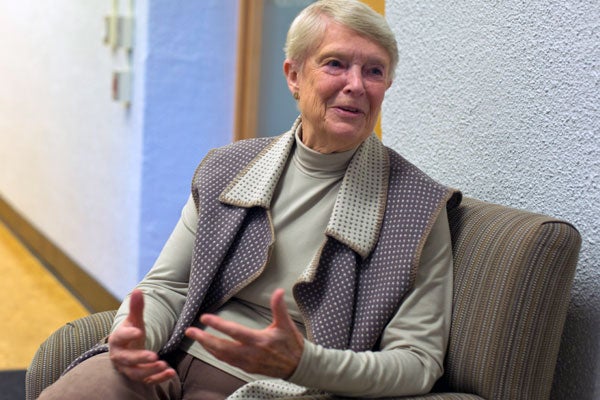
Bicycles, fees and term tests: a year in the life of the University Ombudsperson
Published: March 11, 2014
Bicycle safety, scheduling of term tests, and student fees were some of the issues dealt with by the Office of the Ombudsperson this past year, according to the office’s recently released annual report.
Ombudsperson Joan Foley and her staff – assistant ombudsperson Garvin De Four and assistant Stephanie Ellul – handled 360 cases in 2012-13, an increase of 72 cases over the previous year. In the majority of cases (194), the Office provided the complainant with information – such as explaining policies and procedures and available courses of action. The office resolved 33 cases, provided referrals for 76 others and decided no action was required for 37 cases.
“Although the number of individual cases is small in relation to the total University population, the matters that people bring to us are very significant to them,” Foley says. “Recognizing this, we strive to respond quickly.”
The office’s website explains the role of the ombudsperson as someone who helps members of the University community by identifying options, explaining University policies, providing neutral advice and assisting parties to resolve disputes. But she’s not an advocate, Foley emphasizes.
“The ombudsperson is required to act impartially, neither as an advocate for a complainant nor as a defender of the University, but rather assisting informally in achieving procedural fairness and reasonable outcomes.”
Foley has a long history of service with the University, having started in 1963 as a special lecturer in psychology. Although she officially retired in 2001, she continued to teach and work on special projects at the Scarborough campus until her appointment as ombudsperson in 2007.
Provost Cheryl Regehr says Foley has been outstanding in the role of ombudsperson, a position that she says is vital to the University’s reputation for integrity and fairness.
“As ombudsperson, Joan Foley has demonstrated her deep understanding of the University, her concern for fairness and her sensitivity in handling complex and often difficult situations. Over the past 50 years she has served the University with dedication and distinction, as a teacher, as an administrator and now as ombudsperson.”
In her report, Foley notes that University administrators have been very helpful in resolving cases and in instituting changes when necessary, for example, in clarifying information about international student fee exemptions and the rights of non-degree students to register for courses.
Foley says the types of cases vary depending on whether the complainant is a student, faculty member or staff. For example, the biggest issue for graduate students, who are proportionally the office’s biggest users, is their relationship with supervisors. Her office has been working with University administrators for several years to better educate students and their supervisors about the rights and responsibilities involved in the supervisory relationship. The University has responded positively, she says, and concrete changes, such as a redesigned website and orientation sessions for students and supervisors, have resulted from the ombudsperson’s recommendations.
Foley says that some issues – such as student fees – surface year after year. But this year saw a new complaint – a member of the University community raised the issue of service and commercial vehicles blocking bicycle lanes on streets on the St. George campus.
"These parking violations put cyclists at risk when they have to swerve out into the car lane,” Foley notes in her report. Foley gave the complainant advice on how to bring her concerns to the City of Toronto, which is responsible for the streets. Foley also discussed the issue with U of T administrators. Though they told her that the University is not able to do anything about parking on bike lanes on city streets, they did say that University contractors and facilities and service staff would be reminded about parking in bike lanes.
Complainants don’t always get the outcome they hoped for, Foley says.
“While intervention by the office sometimes results in the outcome sought; that would not necessarily be appropriate. Upon investigation, the original decision may be seen to be fair. A complainant may have inappropriate or unrealistic expectations. In any case, we try to ensure that all who approach the office leave with a better understanding of their issues and greater capacity to deal with them.”
The Office of the Ombudsperson promises confidential, impartial, independent and accessible services. You can contact the office by phone (416- 946-3485), email (ombuds.person@utoronto.ca) or online at http://www.utoronto.ca/ombudsperson/ombuds_assist.html.
For more information, you can visit their website or read the report.
Terry Lavender is a writer with University Relations at the University of Toronto.



